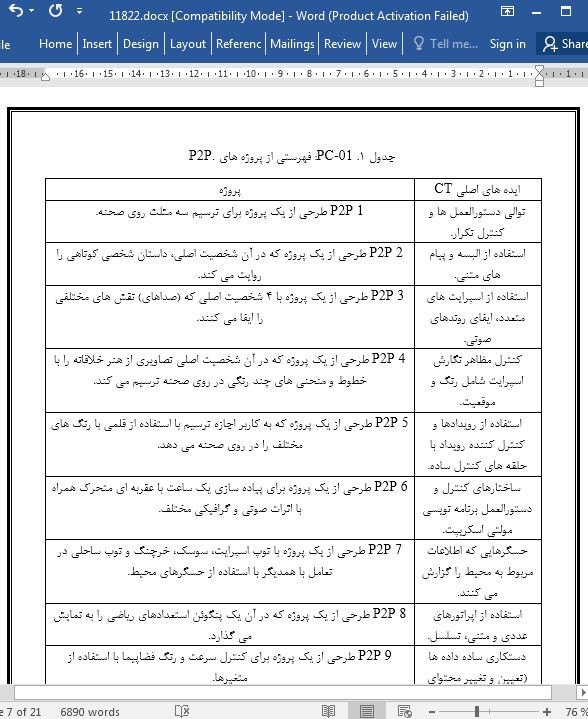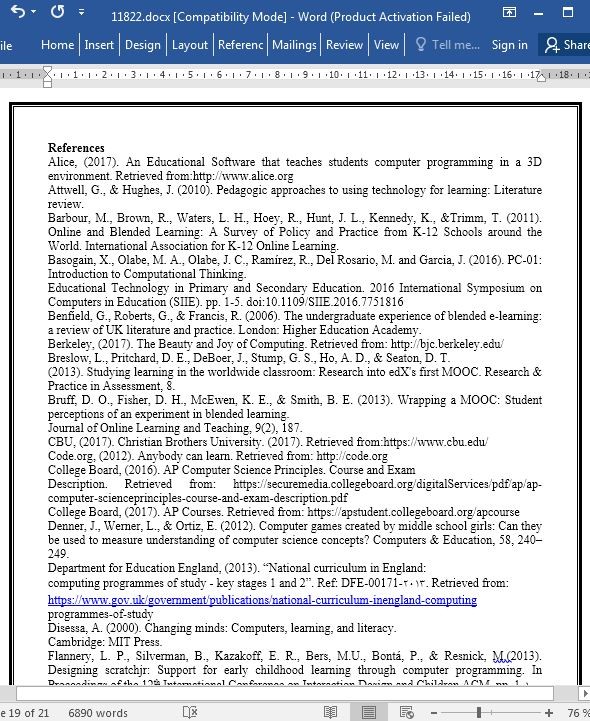
تفکر محاسباتی در کلاس های یادگیری تلفیقی پیش دانشگاهی
چکیده
مقاله حاضر به توصیف اجرای عناصر اصلی مختلف تفکر محاسباتی (CT) در کلاس های مدارس آمریکای لاتین و ایالات متحده آمریکا در دو دوره خاص PC-01 و ECE130 می پردازد. دوره های مزبور برای دانش آموزان دوره ابتدایی و متوسطه و نیز دانش آموزان دوره دبیرستان به عنوان بخشی از برنامه ثبت نام دوگانه با یک دانشگاه محلی طراحی شده بودند. هر دو دوره به ارائه مفاهیم و فرآیندهای اصلی CT با کمک محیط های برنامه نویسی بصری Scratch و Alice می پردازند. دوره های مزبور از سوی معلم کلاس و با حمایت از پلت فرم یادگیری تسهیل می گردد. این پلت فرم برای ارائه استراتژی های آموزشی نوآورانه مبتنی بر فناوری های نوظهور آموزشی پیکربندی شده است. مقاله حاضر تحت عنوان CT به توصیف مفاهیم یکپارچه پرداخته و درباره فواید محیط های یادگیری که برای گنجاندن CT در کلاس ها به کار می روند بحث و گفتگو می نماید. هم چنین تحقیق حاضر به توصیف سرفصل ها و ارزیابی های هر دو دوره پرداخته و تاثیر دوره های مزبور را بر موسسات آموزشی، آموزگاران و دانش آموزان تحلیل و تحلیل می نماید.
1. مقدمه
پس از یک دوره گذار که در آن ایده های بنیادین مطرح شده توسط CT از سوی حوزه های آموزش عمومی و خصوصی مورد مطالعه و تجزیه و تحلیل قرار گرفت، به نظر می رسد که یک اتفاق نظری به وجود آمده که می تواند به شکل دهی تصمیمات و سیاست های آتی در آموزش K-12 منجر گردد (هابوایزر، آرمونی، جیاناکوس و میترمایر، 2014). یک پیامد مهم تلاقی این ایده ها، تعریف برنامه درسی K-12 با تلفیق ایده های اصلی CT است که جدای از آن انگاره های خاص کلاس ها توسعه خواهند یافت. افزون بر این، باور عمومی بر این است که برنامه نویسی در اشکال مختلف آن، ساز و کار ضروری در پیاده سازی مفاهیم اصلی CT و بهترین شیوه های آن محسوب می شود. برنامه نویسی سه ساز و کار مورد نیاز یک زبان را در راستای ایجاد سیستم های پیچیده ارائه می نماید: مجموعه ای از اصول اولیه؛ برخی از ابزارهای ترکیب؛ و انتزاع یا تجرید . برخلاف زبان های طبیعی، که بر اساس طراحی نیمه ساختاریافته بوده و توانایی محدودی از انتزاع چندسطحی را فراهم می نمایند، زبان های برنامه نویسی برای تحقق ایده های اصلی CT طراحی شده اند. یک اندیشه مجهز به ساز و کارهای زبان های برنامه نویسی شیء محور آماده می گردد تا پذیرای اصول CT و توسعــه ایده های CT باشد.
Abstract
This article describes the implementation of various core elements of Computational Thinking (CT) in the classrooms of schools of Latin America and USA in two specific courses: PC-01 and ECE130. These courses were designed for students of primary and secondary education, as well as for students of high school as part of a dual enrollment program with a local university. Both courses introduce the core concepts and processes of CT aided by the visual programming environments Scratch and Alice. The courses are facilitated by the classroom teacher with the support of a learning platform. This platform is configured to provide innovative pedagogical strategies based on emerging educational technologies. This article describes the concepts integrated under the term CT, and discusses the benefits of learning environments used to incorporate CT in the classroom. It describes as well the syllabi and assessments of both courses, and analyzes their impact of these courses on the educational institutions, the teachers and the students.
1. Introduction
After a period of transition in which the fundamental ideas promoted by CT were studied and analyzed by the constituencies of public and private education, it appears that a consensus is being reached which can shape future decisions and policies in K-12 education (Hubwieser, Armoni, Giannakos and Mittermeir, 2014). One important consequence of this confluence of ideas is the definition of K-12 curricula with the integration of the core ideas of CT, out of which the particular classroom paradigms will be developed. In addition, it is universally agreed that programming, in its various forms, is a necessary mechanism for the implementation of CT core concepts and best practices. Programming provides the three mechanisms required by a language in the creation of complex systems: a set of primitives; some means of combination; and abstraction. Unlike natural languages, which by design are semi-structured and provide limited ability of multilevel abstraction, programming languages have been designed to realize the core ideas of CT. A mind equipped with the mechanisms of object oriented programming languages is prepared to house the principles of CT and is prepared to develop CT ideas.
چکیده
1. مقدمه
1.1. تفکر محاسباتی
1.2. یادگیری تلفیقی
2. دوره PC-01
2.1. محتوا
2.2. ارزیابی ها
3. دوره ECE130
3.1. محتوا
3.2. ارزیابی ها
4. بحث
4.1. تاثیر بر موسسات آموزشی
4.2. تاثیر بر معلمان و بار آموزشی
4.3. تاثیر بر دانش آموزان
4.4. شرکت کنندگان و نتایج
4.5. جهت گیری های آتی
5. نتیجه گیری
منابع
Abstract
1. Introduction
2. PC-01 course
2.1. Content
2.2. Assessments
3. Course ECE130
3.1. Content
3.2. Assessments
4. Discussion
4.1. Impact on Educational Institutions
4.2. Impact on Teachers and Teaching Loads
4.3. Impact on Students
4.4. Participants & Results
4.5. Future directions
5. Conclusion
Acknowledgment
References
- اصل مقاله انگلیسی با فرمت ورد (word) با قابلیت ویرایش
- ترجمه فارسی مقاله با فرمت ورد (word) با قابلیت ویرایش، بدون آرم سایت ای ترجمه
- ترجمه فارسی مقاله با فرمت pdf، بدون آرم سایت ای ترجمه



